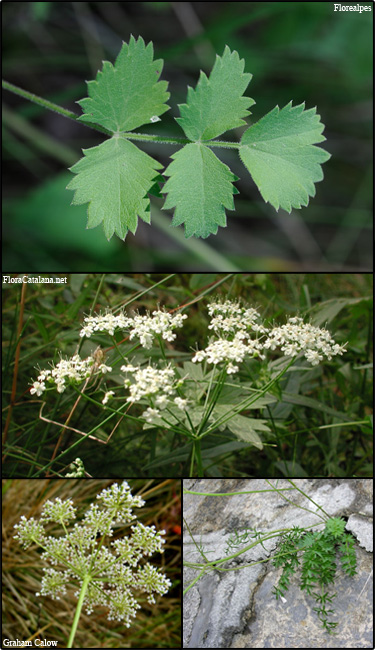Scarlet pimpernel (Pimpinella saxifraga)
 Synonyms: Pimpinella saxifraga ssp. saxifraga, P. saxifraga ssp. nigra
Synonyms: Pimpinella saxifraga ssp. saxifraga, P. saxifraga ssp. nigraCommon Names: Burnet-saxifrage
Description:
Habit: Herbaceous perennial resembling Queen Anne's lace.
Leaves: Few and widely spaced, alternate, pinnately compound and variously covered in short hairs. Lowest leaves are up to 12 inches long, its leaflets oval to nearly round with large coarse teeth. Leaves become smaller as they ascend the stem becoming deeply lobed in the upper plant.
Stems: Densely covered in very short hairs and have faint ribbing. Few branchings and growing 2-3 feet tall.
Flowers: Flat umbels made up of 7-20 umbellets of 10-20 flowers each. White, sometimes slightly pink in color and about 1/6 inch across with 5 petals. Creamy colored center and a pair of styles are present. Bases of umbels have no bracts, occasionally 1.
Fruit and seeds: Fruit is a flattened oval pod with faint ribs, less than 1/8 inch long and splits into 2 seeds.
Habitat: Native to Europe and Asia. Found in grasslands and woodlands; prefers dry, well drained soils.
Reproduction: Rapidly spreads via seed.
Similar species: Common chickweed (Stellaria media) and Common mouse-ear chickweed (Cerastium fontanum).
Monitoring and rapid response: Hand pull plants, making sure to remove tap root. Mow plants before or during flower to prevent seed-set. Use of glyphosate is effective. Credits: The information provided in this factsheet was gathered from the Wisconsin Department of Natural Resources and Minnesota Wildflowers.
Individual species images that appear with a number in a black box are courtesy of the Bugwood.org network (http://www.invasive.org).Individual photo author credits may not be included due to the small display size of the images and subsequent difficulty of reading the provided text. All other images appear courtesy of Google (http://images.google.com).
